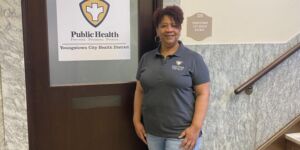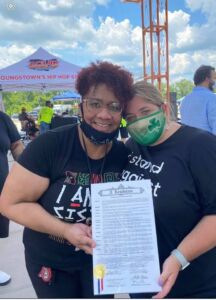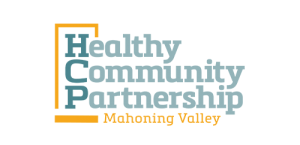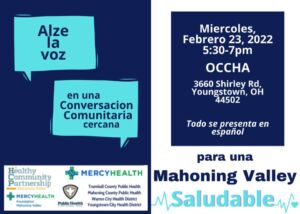HCP Partner Spotlight: Leigh Greene
Director of Community Health at Mercy Health Youngstown

National Institute on Minority Health and Health Disparities 2022 National Minority Health Month Header
In April, we celebrate National Minority Health Month, Black Maternal Health Week, National Public Health Week, and World Health Day. Which means, we also celebrate one of our public health sheroes who has dedicated her life and career to promoting health equity: Leigh Greene.
First, an overview of the origins and purpose of National Minority Health Month:
- Build awareness about the disproportionate burden of premature death and illness in people from racial and ethnic minority groups.
- Encourage action through health education, early detection and control of disease complications.
The origin of National Minority Health Month is in the 1915 establishment of National Negro Health Week by Booker T. Washington. In 2002, National Minority Health Month received support from the U.S. Congress with a concurrent resolution (H. Con. Res. 388) that “a National Minority Health and Health Disparities Month should be established to promote educational efforts on the health problems currently facing minorities and other health disparity populations.” The resolution encouraged “all health organizations and Americans to conduct appropriate programs and activities to promote healthfulness in minority and other health disparity communities.”

Leigh Greene in her role as Director of the Office for Minority Health at the Youngstown City Health District | Photo from Case Western Reserve University
For nearly seven years, Ms. Greene served her community as the Director of the Youngstown Office of Minority Health, which is housed in and supported by the Youngstown City Health District. In June of 2021, she accepted a position as the Director of Community Health at Mercy Health Youngstown. Though her title changed, her passion, commitment, and determination to make Youngstown and the Mahoning Valley a healthier, more equitable community has only been strengthened.

Ed Weisheimer and Leigh Greene, co-chairs for Greater Youngstown Community Dialogues on Racism | Photo from Everyday Democracy
While she was the Director of the Youngstown Office of Minority Health, Ms. Greene represented the Youngstown City Health District on strategic health equity initiatives like the Mahoning Youngstown Infant Mortality Coalition (a.k.a. MY Baby’s 1st) and the Greater Youngstown Community Dialogues on Racism (GYCDOR). Ms. Greene served as a co-chair for GYCDOR for several years.
Both coalitions include members representing multiple sectors and have organized many meetings, created committees, and held events of all sizes. But, all of these diverse activities center on one shared goal: to reduce the harm that racism is causing in our communities.
Some of the signature events that Ms. Green was involved in while she was the Director of the Office Minority Health include:
- Youngstown Citywide Baby Shower
- The Healthy Babies Block Party
- Annual Minority Health Month Conference supported by the Ohio Commission on Minority Health
- GYCDOR Dialogue Circles
- Racial Equity Leadership Breakfast

Leigh Greene & Erin Bishop after passing racism as a public health crisis resolution at 2020 Juneteenth celebration in Youngstown
In 2020, amidst an unforeseen global pandemic and a crescendo of cries for justice after several unarmed Black Americans were killed by law enforcement officers, Ms. Greene and Youngstown City Health District Health Commissioner, Erin Bishop, championed the city taking the bold step to declare racism a public health crisis, which took place during the City of Youngstown’s Juneteenth Celebration. During this tumultuous time, Ms. Greene was completing graduate studies in Community Practice for Social Change at the Jack, Joseph and Morton Mandel School of Applied Social Sciences at Case Western Reserve University, which lifted up her accomplishments and reiterated her mission to apply what she learned during her Masters of Science in Social Administration to: “better serve the minority community in Youngstown.” Ms. Greene continued that, “It is [her] hope that [resources] will be designated to even the playing field so that Black residents and other marginalized groups are given the same opportunities to have healthy and productive lives.”
This year’s theme for National Minority Health Month is Give Your Community a Boost! From the Office of Minority Health, this theme was chosen because, “COVID-19 vaccination, including a booster, is one of the strongest tools we have to end the COVID-19 pandemic that has disproportionately affected communities of color.” Ms. Greene and her colleagues from Youngstown City Health District, the City of Youngstown, and many faith and community based organizations launched the Minority Community Vaccine Assistance Group to accomplish this very mission. This coalition was created “ to address concerns in the Minority Community about the COVID -19 vaccine and to ensure that everyone who wants to get vaccinated, is able to get vaccinated.” Members of the coalition helped to coordinate transportation and made educational PSAs to dispel myths and offer fact-based testimonials to the benefits of vaccines.
In her new role at Mercy Health Youngstown, one of the many responsibilities Ms. Greene has taken on is unofficial coordinator for the complicated but critical Community Health Assessment (CHA) process. We wrote about the CHA Kick-Off in November, and a lot has happened since then. In March, partners organized and facilitated focus groups—nine total—to hear from residents representing groups often underrepresented in the data: Black residents, Latinx residents, residents who are housing insecure, rural residents, and LGBTQ+ residents. Concluding in early April, there were also two opportunities to complete a written survey—a certain number of residents were randomly selected to receive a postcard inviting them to participate and the survey information was also distributed through various means—like social media—to collect responses from a “convenience sample.” Overall, several hundred more surveys were collected this time because of the convenience sample than previously in 2018. This will provide the Mahoning Trumbull Health Partners–the group overseeing the CHA process–with more community feedback and information to inform and guide the Community Health Improvement Plan (CHIP) process. This plan designates health priorities and develops strategies to improve health outcomes in our two-county footprint, so you could say it is kind of a big deal.
Another factor that makes this CHA/CHIP different is adopting more direct and intentional inclusion of health equity as a lens through which decisions are weighed and made. Since the declarations of racism as a public health crisis in 2020, local health departments and community partners have convened to identify opportunities to take action. The CHA/CHIP process was a natural opportunity to put into practice tools like health equity impact assessments and health and equity in all policies practices and sharpen skills, strengthen muscles to make sure equity is always held in the center. The Partnership is certainly involved and active in these efforts, which include newer collective impact coalitions: Vibrant Valley Health Equity Initiative and the Health Equity network of Ohio. Ms. Greene is present and persist in as many of these coalitions as possible, helping to keep continuity and continued forward momentum even when the challenges we are faced with are complicated and complex.
Off the clock, Ms. Green is active in her sorority–Delta Sigma Theta, Inc. Youngstown Alumni Chapter–and a member of Tabernacle Baptist Church. Her joy is that she is the mother of two adult sons. She was recognized this year as one of nine honorees at the League of Women Voters of Greater Youngstown’s Women’s Hall of Fame event.
No matter which hat she’s wearing or title she’s carrying, Leigh Greene always leads with kindness and a commitment to her community. As Owen Arthur, former Prime Minister of Barbados wisely remarked: “For he who has health has hope; and he who has hope, has everything.” Our gratitude to Leigh Greene for working so hard to give her community health and hope.


